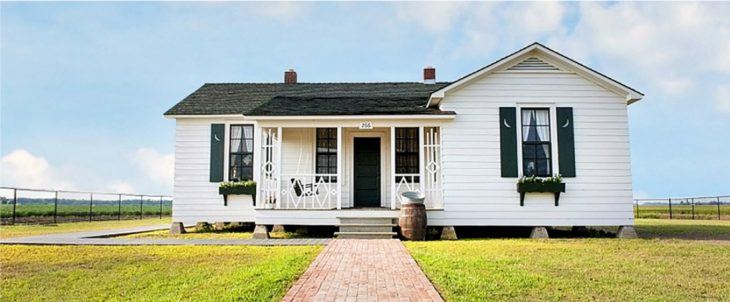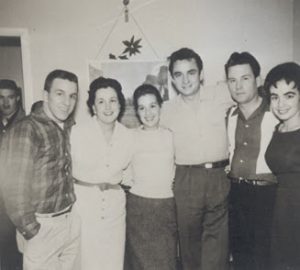Johnny Cash siblings among those who will attend a festival in his honor in Dyess
by May 10, 2017 5:28 pm 7,739 views

The restored Cash home in the Dyess Colony.
It was one of Carrie Cash’s favorite things to do. She would sit on the porch and listen to her children sing. More than 60 years has passed, and Joanne, the sister of immortal music legend Johnny Cash, will return to the place she called home for the first 17 years of her life this fall.
Her brother, Tommy Cash, will also make the trek back, according to Arkansas State University.
“I don’t know how I am going to feel, but I think I am going to cry,” Joanne said. “It’s a point in time that I would have never dreamed could have happened. I can visualize mama coming out and sitting on the porch and watching it, because she loved to hear Johnny and Tommy and me sing.”
The two youngest children in the Cash family clan will visit their childhood home during the Johnny Cash Heritage Festival on Oct. 19-21. The siblings will take part in a concert in a cotton field adjacent to the restored home at the former Dyess Colony in Mississippi County. Grammy-Award winners Rosanne Cash and Kris Kristofferson will perform along with country music singer Buddy Jewell.
Drought, sporadic floods, and the Great Depression decimated family farms in the early 1930s. President Franklin Roosevelt started what was then called a socialistic plan to help many of these farmers in eastern Arkansas.
Ray and Carrie Cash brought their family to the Dyess Colony in 1935, according to historians. The Cashes moved to Dyess with their five children, Roy, 13; Louise, 11; Jack, 5; J. R., 3; and Reba, 1. Joanne and Tommy were born in Dyess.
During that era, the area was more swamp than usable farm ground. Workers drained the swamp and 500 farm families, including the Cash family received 40 acres and a mule through a federal government aid program. Rice and cotton were grown. Johnny Cash, along with his brother, Jack, worked the family farm and attended school. Work in the fields was grueling. At night, Johnny and Jack spent a lot of time in their room.

Their father, Ray was a strict disciplinarian who worked extremely hard, Joanne said. The children toiled in the cotton fields alongside their parents, she said. Johnny, along with his siblings, was raised in humble circumstances and the Cash children were taught to work for what they earned, she said.
Jack died in a wood cutting accident as a youth. Music historians attribute Cash’s dark, brooding style to his brother’s unexpected death. Johnny served in the military after high school. He came home periodically to visit his parents. They moved to Memphis in 1956. Cash returned to his old homestead years after he became an internationally famous with songs such as “Folsom Prison Blues,” “Walk the Line,” “Ring of Fire,” and others. His battles with drug and alcohol were well documented, and he is often referred to as “The man in black,” a reference to his all black clothing attire he wore during performances.
ASU began restoration on the Cash childhood home in 2011. The dwelling was restored to its original condition, and an administrative building built into the old Colony theatre. The project cost about $3.5 million. The heritage festival began after a series of successful concerts were held at the ASU Convocation Center starting in 2011 honoring Jonny Cash’s legacy. The next phase of the project will include rebuilding the outbuildings at the Cash farmstead, including the barn, smokehouse, chicken coop, and privy, according to ASU.
The first time Tommy saw the renovated house it took his breath away, he said. He thinks his brother would enjoy and appreciate the way he’s been honored in Mississippi County, he said.
“I know when I am standing onstage and see the old home place, it probably will bring me to tears because it’s just awesome,” Tommy said.
No economic impact studies have been conducted to determine the effect the Colony has had on the economy in the county, but more than 700 visitors a month tour the house, administrative building, and grounds. Many of the visitors come from Memphis.
Graceland is the Memphis home of one of Cash’s contemporary musicians, Elvis Presley. Cash, Presley, Jerry Lee Lewis, and other musicians from that era played at bars, clubs, and other honky tonks along U.S. 67 from Newport to Pocahontas in the early and mid-1950’s. Musicians made more money in rural venues than they did in bigger cities like Memphis, St. Louis, Little Rock, and others.
The small town venues allowed gambling, and local law enforcement turned a blind eye, according to historians. The additional revenue source allowed club owners to pay premium prices for musicians to entertain.
Joanne has a gospel music ministry at the Nashville Cowboy Church, which she co-founded with her husband, Dr. Harry Yates, according to ASU. She looks forward to the festival honoring her brother, and their family.
“They say you can’t go back, but I am,” Joanne said. “Tommy and I are going back because we can walk into that house. I can walk through the house and walk through the bedrooms where we slept and walk in the kitchen where I have watched Mama hundreds of times cook from scratch a meal to feed seven children.”
